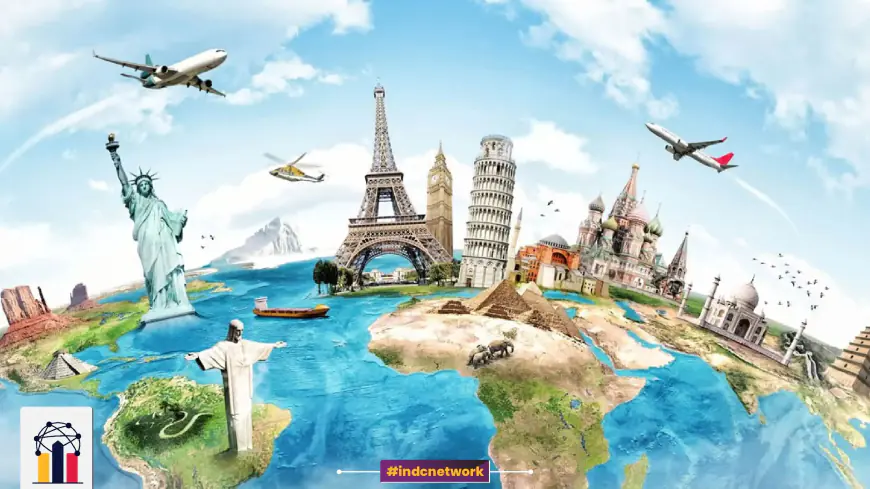The Hidden Forces Shaping the Tourism and Hospitality Industry: What You Need to Know
Delve into the dynamic world of tourism and hospitality, uncovering the key factors driving industry trends and transformations. This comprehensive analysis explores the impact of technology, changing consumer preferences, economic fluctuations, and sustainability concerns, revealing the hidden forces that shape the future of travel and hospitality.

INDC Network : Business : The Hidden Forces Shaping the Tourism and Hospitality Industry: What You Need to Know
The tourism and hospitality industry is a vibrant and multifaceted sector that significantly impacts the global economy and cultural exchange. It encompasses a wide range of services, including travel, accommodation, food and beverage, and entertainment. As the industry continues to evolve, understanding the underlying forces that drive its trends and transformations is crucial for stakeholders, travelers, and investors alike. This article explores the dynamic world of tourism and hospitality, uncovering the key factors influencing its development and future trajectory.
Historical Evolution of Tourism and Hospitality : To appreciate the current state of tourism and hospitality, it’s essential to understand its historical evolution and how it has transformed over the centuries.
1. Ancient Travel and Hospitality:
- Early Trade Routes: Travel in ancient times was primarily for trade and exploration. The Silk Road and maritime routes connected various civilizations, facilitating the exchange of goods, culture, and ideas.
- Roman and Greek Inns: Early forms of hospitality included inns and guesthouses established by the Romans and Greeks to accommodate travelers. These establishments provided basic lodging and meals, setting the foundation for modern hospitality services.
2. The Grand Tour Era:
- 18th and 19th Centuries: The concept of travel for pleasure became popular during the 18th and 19th centuries with the Grand Tour, a journey undertaken by young European aristocrats to explore art, culture, and history. This period marked the beginning of leisure travel and the development of more sophisticated travel services.
3. The Rise of Mass Tourism:
- 20th Century Innovations: The 20th century saw the rise of mass tourism, driven by advancements in transportation, such as automobiles and airplanes. The development of commercial airlines and affordable travel options made it possible for more people to explore different destinations.
- Hotel Chains and Standardization: The growth of hotel chains and standardized services provided consistent quality and convenience for travelers. Major hotel brands emerged, offering a range of accommodations and amenities.
4. The Digital Age:
- Internet and Online Booking: The advent of the internet and online booking platforms revolutionized the tourism and hospitality industry. Travelers gained access to a wealth of information, and booking processes became more streamlined and accessible.
- Social Media Influence: Social media platforms began to play a significant role in shaping travel preferences and influencing destination choices. User-generated content and reviews provided valuable insights for potential travelers.
Current Trends in Tourism and Hospitality : The tourism and hospitality industry is characterized by rapidly changing trends driven by technological advancements, evolving consumer preferences, and global events.
1. Technology and Digital Transformation:
- Online Travel Agencies (OTAs): Online travel agencies, such as Expedia and Booking.com, have become central to the booking process, offering travelers a wide range of options and competitive prices. OTAs have transformed how consumers research and book travel services.
- Mobile Technology: The proliferation of smartphones and mobile apps has enabled travelers to access information, make bookings, and manage their travel experiences on the go. Mobile technology has also facilitated the rise of digital payment systems and contactless services.
- Virtual Reality (VR) and Augmented Reality (AR): VR and AR technologies are enhancing the travel experience by providing virtual tours, interactive maps, and immersive destination previews. These technologies offer travelers a glimpse into their potential experiences before making decisions.
2. Changing Consumer Preferences:
- Experiential Travel: Modern travelers are increasingly seeking authentic and immersive experiences. Experiential travel focuses on cultural enrichment, local interactions, and unique adventures, moving beyond traditional sightseeing.
- Sustainable Tourism: There is a growing demand for sustainable tourism practices that minimize environmental impact and support local communities. Eco-friendly accommodations, responsible travel practices, and conservation efforts are becoming key considerations for travelers.
- Health and Wellness Tourism: Health and wellness tourism, which includes activities such as spa treatments, yoga retreats, and wellness programs, is gaining popularity. Travelers are seeking destinations and experiences that promote physical and mental well-being.
3. Economic and Global Influences:
- Economic Fluctuations: Economic conditions, including currency fluctuations and economic downturns, impact travel spending and industry performance. The global economic climate influences consumer confidence and discretionary spending on travel and hospitality.
- Geopolitical Events: Geopolitical events, such as political instability and travel restrictions, can affect tourism flows and destination attractiveness. Safety concerns and government policies play a significant role in shaping travel patterns.
4. Sustainability and Environmental Concerns:
- Climate Change: Climate change and environmental degradation are significant concerns for the tourism industry. Rising temperatures, extreme weather events, and natural disasters impact destinations and travel patterns.
- Conservation Efforts: Many tourism and hospitality businesses are adopting conservation efforts to mitigate their environmental impact. Initiatives such as waste reduction, energy efficiency, and wildlife protection contribute to sustainable tourism practices.
Key Innovations in Tourism and Hospitality : Innovation is a driving force in the tourism and hospitality industry, continuously enhancing the travel experience and improving operational efficiency.
1. Smart Technology and Automation:
- Smart Hotels: Smart hotels use technology to enhance guest experiences through features such as keyless entry, automated room controls, and personalized services. Internet of Things (IoT) devices enable seamless integration and convenience for guests.
- Robotic Assistance: Robotics are being employed in various aspects of hospitality, including reception, room service, and concierge services. Robots can perform routine tasks, improve efficiency, and provide a unique guest experience.
2. Data Analytics and Personalization:
- Big Data: The use of big data analytics allows tourism and hospitality businesses to gain insights into customer behavior, preferences, and trends. Data-driven decision-making enables personalized recommendations, targeted marketing, and optimized services.
- Customer Relationship Management (CRM): CRM systems help businesses manage and analyze customer interactions, improving relationship management and customer satisfaction. Personalized offers and tailored experiences are facilitated through CRM platforms.
3. Sustainable Innovations:
- Green Building Standards: Many hotels and resorts are adopting green building standards, such as LEED certification, to promote environmental sustainability. Sustainable design, energy-efficient systems, and waste management practices contribute to eco-friendly operations.
- Renewable Energy: The use of renewable energy sources, such as solar and wind power, is increasing in the tourism and hospitality sector. Renewable energy reduces reliance on fossil fuels and minimizes carbon footprints.
4. Experiential and Niche Travel:
- Adventure Tourism: Adventure tourism offers unique and thrilling experiences, such as hiking, trekking, and extreme sports. Destinations catering to adventure seekers provide specialized services and activities.
- Culinary Tourism: Culinary tourism focuses on food and beverage experiences, including gourmet dining, food festivals, and cooking classes. Food-centric travel highlights local cuisine and cultural traditions.
Challenges Facing the Tourism and Hospitality Industry : The tourism and hospitality industry faces several challenges that impact its growth and sustainability.
1. Health and Safety Concerns:
- Pandemics and Health Crises: Health crises, such as the COVID-19 pandemic, have a profound impact on the tourism industry. Travel restrictions, safety protocols, and changing consumer behavior affect travel patterns and industry recovery.
- Sanitation and Hygiene: Ensuring high standards of sanitation and hygiene is crucial for maintaining guest safety and confidence. Enhanced cleaning practices and health protocols are essential for addressing health concerns.
2. Over-Tourism and Environmental Impact:
- Destination Overcrowding: Over-tourism can lead to overcrowding, environmental degradation, and negative impacts on local communities. Managing visitor numbers and promoting sustainable tourism practices are key to mitigating over-tourism.
- Resource Depletion: The high demand for resources, such as water and energy, can strain local infrastructure and ecosystems. Sustainable resource management is critical for minimizing environmental impact.
3. Economic and Market Volatility:
- Economic Uncertainty: Economic fluctuations and geopolitical events can affect travel demand and industry performance. Businesses must adapt to changing economic conditions and market trends.
- Competitive Pressure: The tourism and hospitality industry is highly competitive, with businesses vying for market share and customer loyalty. Staying ahead of trends and differentiating services are essential for success.
4. Technology Integration and Cybersecurity:
- Technological Challenges: Integrating new technologies and managing digital transformation can be challenging for businesses. Investment in technology and training are necessary for successful implementation.
- Cybersecurity Risks: The increased use of digital systems and data raises cybersecurity concerns. Protecting sensitive information and ensuring data security are critical for maintaining trust and compliance.
The Future of Tourism and Hospitality : The future of tourism and hospitality is shaped by ongoing trends, innovations, and evolving consumer expectations. Key areas to watch include:
1. Continued Technological Advancement:
- AI and Machine Learning: Artificial intelligence (AI) and machine learning will further enhance personalization, automation, and data analysis in the tourism and hospitality sector. AI-driven solutions will transform guest experiences and operational efficiency.
- Blockchain Technology: Blockchain technology has the potential to revolutionize various aspects of the industry, including secure transactions, transparent supply chains, and decentralized booking systems.
2. Focus on Sustainability and Responsible Travel:
- Eco-Friendly Practices: The emphasis on sustainability will continue to grow, with businesses adopting eco-friendly practices and promoting responsible travel. Sustainable tourism will become a key differentiator and attract environmentally conscious travelers.
- Community Engagement: Engaging with local communities and supporting local economies will be increasingly important. Authentic experiences and community involvement will enhance the value of travel and contribute to positive social impact.
3. Evolution of Consumer Preferences:
- Customizable Experiences: Travelers will seek more customizable and personalized experiences tailored to their preferences and interests. Businesses will need to offer flexible options and unique experiences to meet evolving demands.
- Hybrid Travel Models: Hybrid travel models, combining elements of leisure and business travel, will become more prevalent. The rise of remote work and flexible schedules will influence travel patterns and accommodation choices.
4. Resilience and Adaptability:
- Crisis Management: The ability to adapt to unexpected events and crises will be crucial for the industry’s resilience. Building robust crisis management strategies and fostering adaptability will ensure long-term sustainability.
Conclusion : The tourism and hospitality industry is a dynamic and evolving sector shaped by a multitude of factors, including technological advancements, changing consumer preferences, economic fluctuations, and sustainability concerns. By understanding the hidden forces that influence its development, stakeholders can navigate the complexities of the industry and seize opportunities for growth and innovation.
As we look to the future, the industry must continue to adapt and innovate to meet the demands of a rapidly changing world. Embracing technology, prioritizing sustainability, and enhancing the guest experience will be key to shaping the future of tourism and hospitality. Through strategic insights and forward-thinking approaches, the industry can thrive and continue to offer memorable and enriching experiences for travelers worldwide.
What's Your Reaction?













































































































































































